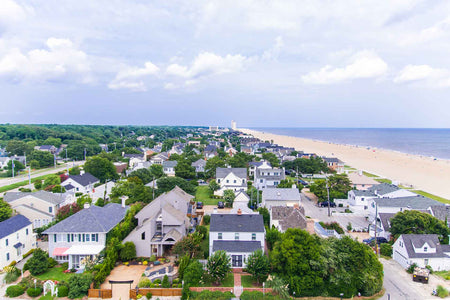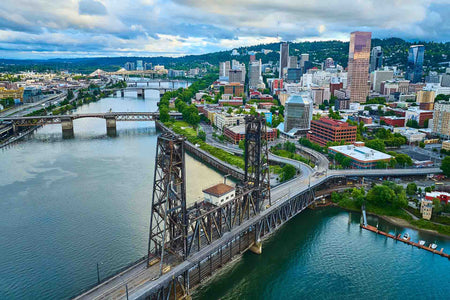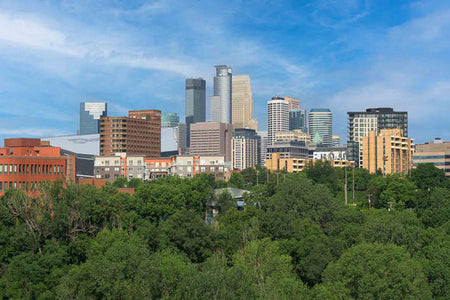Washington state, known for its diverse climate and lush greenery, is also a hotspot for seasonal allergies. From tree and grass pollens to mold spores, each region in Washington has its unique set of allergens, varying with the seasons.
The prevalence of various types of pollen throughout the year can trigger allergic reactions among residents and visitors.
Here's a breakdown of common allergies by season in Washington to help residents and visitors alike understand and manage their allergies better.
Understanding Washington Allergy Seasons
Spring
Spring is typically the worst season for allergy sufferers in Washington. As plants begin to bloom, they release pollen into the air, causing an increase in allergy symptoms. Tree pollens, particularly from juniper, oak, birch, alder, cedar, and maple, are some of the most common allergens during this season.
Summer
In summer, grass pollen becomes the primary allergen. Bermuda, rye, orchard, Timothy grass, and red top are among the main culprits.
Related: Summer Allergies Guide
Fall
Fall brings relief for some allergy sufferers, but for others, it marks the beginning of ragweed and Russian thistle season. Ragweed plants are common in Washington and can produce a large amount of pollen. Mold spores can also be problematic due to falling leaves creating damp conditions.
Related: Fall Allergies Guide
Winter
Winter allergies in Washington are primarily due to indoor allergens, as people spend more time inside. Dust mites, pet dander, and indoor mold can all trigger allergic reactions.
Which Regions in Washington Have the Highest Allergen Levels?
Western Washington
Western Washington, including cities like Seattle, Tacoma, and Olympia, is known for its damp climate and lush greenery. This region sees high levels of tree pollen, particularly from cedar, alder, and pine trees, in the spring. Grass pollen, especially from ryegrass and bluegrass, becomes prevalent in the summer. The fall season brings ragweed pollen and mold spores due to falling leaves and damp conditions.
Eastern Washington
Eastern Washington, encompassing Spokane, Yakima, and the Tri-Cities, has a drier climate compared to the western part of the state. Tree pollen, especially from pine and oak trees, is common in the spring. Grass pollen, primarily from Timothy grass, is a significant allergen in the summer. In the fall, weed pollens, such as sagebrush and Russian thistle, become problematic.
Puget Sound Region
The Puget Sound region, including cities like Bellevue, Everett, and Bellingham, experiences similar allergens to the rest of Western Washington. However, this area also sees high levels of mold spores year-round due to its proximity to water bodies.
Cascade Mountains
The Cascade Mountains region, home to Mount Rainier and Mount Baker, has fewer allergens due to its higher elevation. However, tree pollen can still be an issue in the spring, and mold spores may be present in damp, wooded areas.
In conclusion, each season in Washington brings its unique set of allergens. Understanding what triggers your allergies and when these allergens are most prevalent can help you manage your symptoms better. Always consult with a healthcare provider for personalized advice and treatment options.
Related: Pollen Count in Washington, D.C
Tips for Managing Allergies in Washington
Living with allergies in Washington can be challenging due to the damp climate, which leads to mold growth and higher pollen counts. The good news is that there are steps you can take to manage your allergies and reduce their impact on your life.
- Identify the specific allergens that affect you through allergy testing done by a doctor. Once you know which allergens affect you, you can take steps to minimize your exposure to them.
- Keep your home clean and dust-free by regularly vacuuming carpets and furniture. Use a HEPA air filter to reduce the amount of allergens in the air. It is also helpful to keep windows and doors closed during high pollen days.
- Consider taking over-the-counter or prescription allergy medication to help manage your symptoms. Antihistamines, nasal sprays, and eye drops are all viable options, but be sure to speak with a doctor or pharmacist before starting any new medication.
- If your allergies are severe or interfering with your daily life, consider seeing an allergist for more specialized testing and treatment options, such as allergy shots.
In summary, managing allergies in Washington requires some effort and vigilance, but with the right tools and resources, you can minimize the impact they have on your life.
Washington Allergy FAQ
Washington state is known for its beautiful scenery, fresh air, and outdoor activities. However, it's also home to a variety of allergens that can make life difficult for those who suffer from allergies. Here are some frequently asked questions about allergies in Washington state.
What are the most common allergens in Washington state?
The most common allergens in Washington state include tree pollen, grass pollen, and ragweed pollen. In addition, mold spores and dust mites can also trigger allergies.
When is allergy season in Washington state?
Allergy season in Washington state typically starts in late February or early March when tree pollen begins to bloom. Grass pollen season starts in late May or early June, and ragweed pollen season typically starts in mid-August and lasts through October.
What are some ways to prevent allergy symptoms?
There are several ways to prevent allergy symptoms, including staying indoors during peak pollen times, using an air purifier, washing bedding in hot water, and taking allergy medication as prescribed by your doctor.
Can allergies be treated?
Yes, allergies can be treated. Treatment options include over-the-counter or prescription medication, allergy shots, or nasal sprays… like Allermi!
When should I see a doctor for my allergies?
You should see a doctor if your allergy symptoms are severe or interfere with your daily life. In addition, if over-the-counter medication is not effective, you should see a doctor for further treatment options.
Remember, it's important to consult with a healthcare professional if you have any concerns about your allergies. They can help you determine the best course of action for managing your symptoms and improving your quality of life.
Customized Allergy Treatment at Home
Using multiple over-the-counter allergy treatments is not ideal for getting through allergy season in Washington. Skip the drugstore and get a personalized all-in-one allergy treatment from the comfort of your home.
Allermi is a customized allergy nasal spray designed by experienced, board-certified allergists to solve your unique seasonal allergy symptoms. The Allermi formula is backed by science to give you the most effective allergy treatment for your individual allergy symptoms.
The best part? Allermi nasal spray is easy to use and delivered to your door in Washington.









